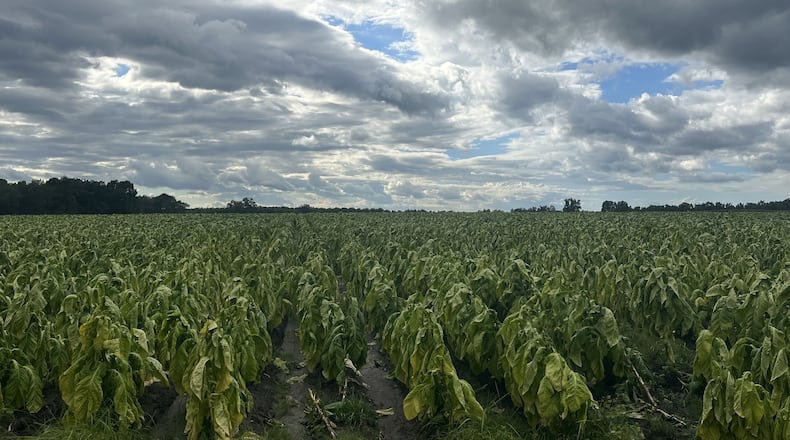Tobacco farmers in Georgia are reporting significant damage from the storm known as Debby that drenched the Southeast this week.
While the worst of the storm predictions did not come to pass, tobacco was just coming into its prime and ready for harvest when Debby hit.
J. Michael Moore, a tobacco specialist with the University of Georgia, estimated losses in the state between 50% and 75%, though it will take several days to weeks for the full effect to emerge.
“The impact is massive,” said Moore. “Growers were very optimistic about the price that their tobacco was going to receive ... and we don’t have any tobacco to sell.”
Georgia farmers of pecans, cotton and other crops have suffered significant losses in recent years from tropical storm systems. Earlier this summer, many Georgia farmers were grappling with extreme heat and drought baking their fields.
Tobacco has declined as a crop as the number of cigarette smokers has dropped significantly over the years. Today, Georgia growers cultivate about 7,000 square acres, down from 48,000 three decades ago, Moore said.
But even so, those who continue to grow it say it fetches a higher price per acre than most other crops such as cotton, peanuts and pecans. Because the equipment to grow and harvest tobacco is specialized, transitioning to a different crop is difficult, especially in the wake of financial loss, they said.
Credit: SPECIAL
Credit: SPECIAL
Chance Callaway is a fourth generation grower on 300 acres in Tattnall County, about 50 miles from Savannah. He has contracts with two large tobacco companies for 900,000 pounds of tobacco, but said he only managed to harvest about 15% before the storm. He is bracing for a complete wipeout of his remaining crop.
“It’s pretty devastating,” Callaway said. He said crop insurance will not cover all his losses.
Callaway said his family has never experienced the kind of damage wrought by Debby, which flooded his fields and drowned the plants. He said he didn’t know much about climate change as a subject, but he has noticed shifts in weather patterns over the years.
“I’ve definitely experienced some weather in the last few years that has not been the norm,” he said, adding that he lost a third of his crop last year to severe weather.
Credit: SPECIAL
Credit: SPECIAL
For Moore, the UGA expert, the changes in climate are very apparent. Warmer oceans contribute to higher humidity which can produce more intense precipitation, sometimes referred to by climate scientists as “rain dumps.” In recent years, a larger percentage of overall rainfall has fallen during intense, single-day events, according to The National Oceanic and Atmospheric Administration, which oversees the National Weather Service and its many monitoring stations.
Moore said that in the past, rain came down “like pouring out of a teacup,” but “now we get rain showers like it’s being poured out of a five gallon bucket.”
Mark Tucker, a third generation farmer in Atkinson County in southeast Georgia, grows peanuts, cotton and corn, but tobacco is his main cash crop. He estimated he’s lost about 75% of his tobacco and is considering changing his crop mix, but wouldn’t rule out leaving farming altogether.
“This tobacco thing is hard to do with these storms,” said Tucker. “We either get no rain or we get a lot of rain. It’s not anything on norm anymore.”
Reid Turner, a fourth generation farmer, grows about 300 acres of tobacco in Appling County, also in southeast Georgia. He estimated he’s lost 30% to 50% of his tobacco crop.
“We’re trying to save what we can,” he said. “There’s a lot of standing water.”
Turner also grows cotton, pecans and peanuts, but like other growers, he said tobacco was his most valuable crop per acre.
“I have a lot of infrastructure that cannot be used for nothing else, just tobacco production,” he said. “Would I like to switch gears? Yeah, absolutely ... but it’s just not very feasible.”
As for other Georgia crops, Pam Knox, a climatologist at the University of Georgia, wrote in an email that impacts to agriculture can sometimes take several weeks to appear.
“Overall, the impacts were less severe than I expected,” she said.
Note of disclosure
This coverage is supported by a partnership with Green South Foundation and Journalism Funding Partners. You can learn more and support our climate reporting by donating at ajc.com/donate/climate/
About the Author
Keep Reading
The Latest
Featured





